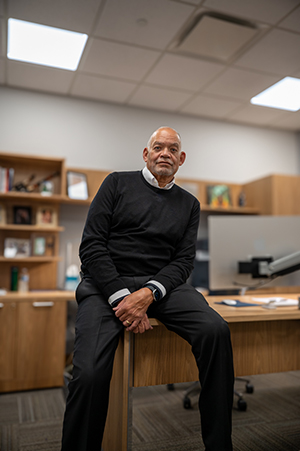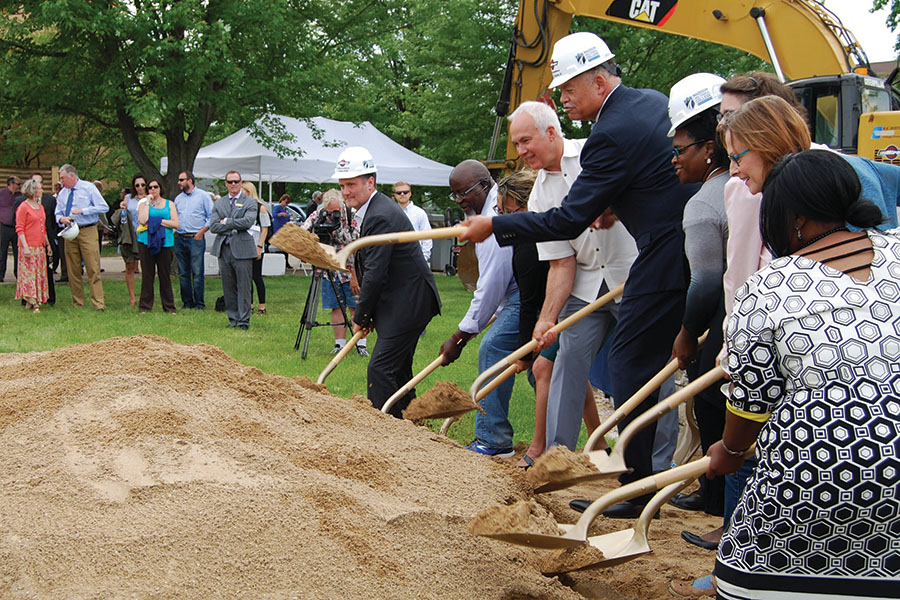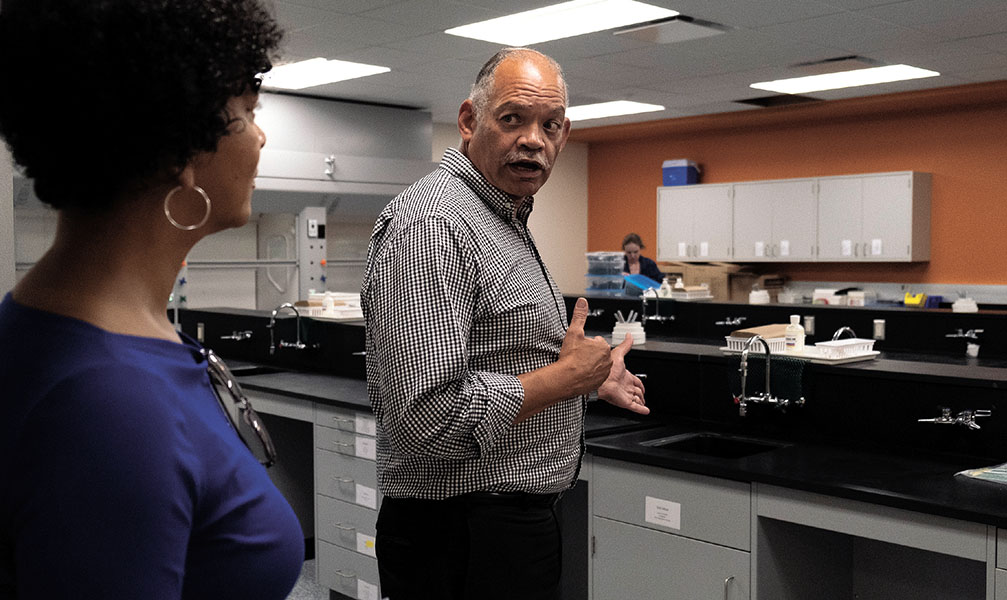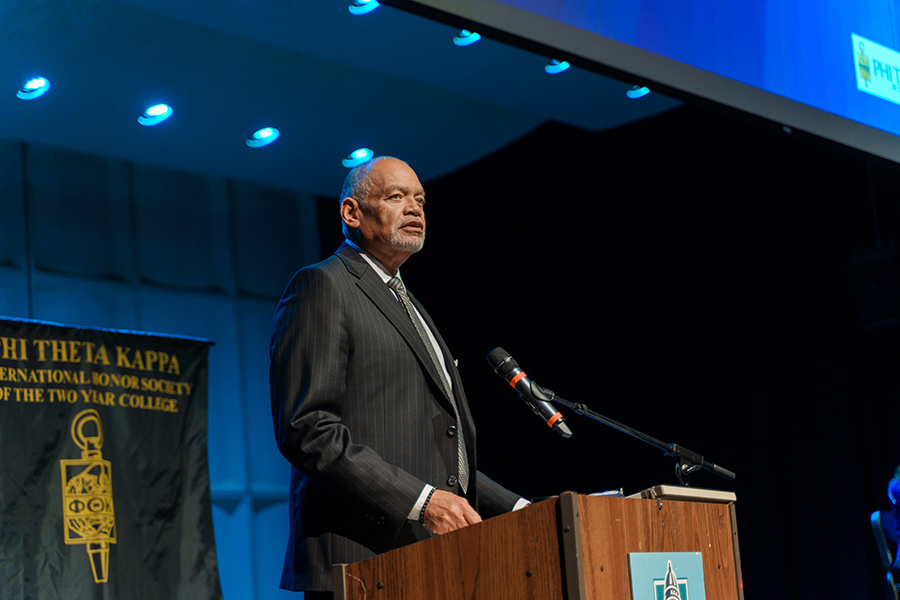Stroll into the Truax campus any day of the week, and you will spot President Dr. Jack Daniels, III, moving around. He frequently talks with students in the hallways, chats with the bookstore cashier, visits lively classrooms or stops by busy lunch tables.
As his 11-year tenure winds down and he prepares for retirement, Daniels reflects on what he will miss most about his career. It is not his accomplishments or accolades that he’ll miss, but rather the moments of student interaction.
In conversations, Daniels is easygoing and relatable, a skill that does not always come naturally to his colleagues across the country, and he encourages all of them to leave their Ivory Tower and check in with the student population. “They need to be out with them. They need to be out with people. That’s what it’s about,” he said.
Before joining Madison College in 2013, Daniels served as Los Angeles Southwest College president for seven years. Before his time on the West Coast, he served as president of Lincoln Land Community College in Springfield, Illinois, and Houston Community College’s central campus.
Originally a law school student, Daniels was drafted into the military and served in the U.S. Army. While stationed overseas in Germany he noticed that incarcerated individuals did not receive access to education. This realization inspired him to consider higher education and seek ways to expand accessibility.
After receiving his Ph.D. in Psychology from the Wright Institute, he began to understand the difference between two-year colleges and four-year universities: two-year colleges tend to form alliances within the community, while four-year universities focus more on research.

Daniels became passionate about two-year colleges because he believed in forming deep connections with the city’s residents, neighborhoods and businesses. He also recognized another disparity between the two types of institutions: at the time, four-year Research 1 universities only accepted 5% of college applicants, leading Daniels to ask, “What happened to the other 95% of students?”
A source of inspiration was Dale Parnell’s “The Neglected Majority,” a book published in the late ‘80s. Parnell suggested ways that community, technical, junior colleges and local high schools can collaborate for most high school students who may not earn a postsecondary degree.
After reading, Daniels realized he was drawn to this overlooked population of students left behind. “That’s the folks I really wanted to work with,” he said.
This past January, as Daniels entered his last year as a leader at Madison College, he faced a busy schedule of recognition, goals and unpredicted events, including accepting the Martin Luther King, Jr. Humanitarian Award Honorees award and receiving an unexpected visit from President Biden. He has also taken time to give thought to his achievements at the college and to consider his legacy.

Goodman South
In 2016, determining a need for a new southern Madison campus for students who struggled with access to the Truax Center, Daniels assembled an alliance of city leaders, reaching out to the businesses and communities that supported the region.
Daniels noticed that many students from South Madison were not attending the Truax Campus. “Why did they not come up to Truax? Because they felt overwhelmed coming here, notwithstanding the transportation,” said Daniels, explaining the two-hour shuttles from some of the campuses.
He envisioned building a new campus to replace the school’s former location in Villager Mall. This new site would attract students who attended the school’s downtown location to the new campus, and it would also draw Black and Latino students living nearby.
The Goodman South campus opened in the fall of 2019 and Daniels remains proud of the collective work and collaboration done in South Madison. “That was a shining moment. On the first day of the Goodman South opening, we stood on the steps and could see students coming from the neighborhood,” Daniels said.

Due to the Goodman South campus, Daniels is regularly mentioned as the force behind an initiative often cited as helping reinvigorate Madison’s south side. He’s quick to dismiss the spotlight, crediting the hundreds of people who reached out to accomplish the creation of the campus.
“I’m the face of the institution. But the work is done by countless folks who work here. They are the ones that make it happen. It’s the faculty. The staff. It’s the custodians. It’s the folks from Public Safety. All of them together are working to make that happen,” he said, highlighting the key role of each contributor.
Lasting Impact
Every semester, Daniels sees his lasting impact on Graduation Day and emphasizes that students must know they belong. He loves seeing the joy beaming in the many faces he sees during every commencement, men and women on the cusp of starting new lives in their chosen direction. Those are the images that are etched in his mind.
Daniels, who will attend his 23rd graduation this month, said, “Seeing those students — some of them — the barriers they have overcome to get where they are. That is the joy. That’s the joy that needs to continue.”
However, before the students can start a new chapter of life, whether post-graduation or just beginning at the college, Daniels has some guidance. He stresses the need for students to realize their limitations and barriers and use the school’s resources to help them determine what they want to do. “What you want to do today may be different in 10 years, and that’s OK. What you do today may be different in a year. That’s OK,” he said.

According to Daniels, students need to be more resourceful and aware of the school’s services, meaning the college needs to do better by engaging students to listen and ask, pointing them in the right direction. “Students also have to feel comfortable to say they’re having a problem — it could be an academic problem or another problem,” he said.
He said that while they have come a long way since 2013, the year he started as president, there is quite a way to go so the students feel comfortable. “The whole issue of belongingness is part of that. If you belong, you are more open, relaxed and feel respected,” Daniels said.
He has advice for another population: the college’s veterans.
Daniels, a veteran, says the college’s commitment to veterans is excellent but can always use improvement.
He said that veterans are often not given the opportunity to access resources and that the college needs to continue to push that for every population.
“Which goes back to the sense of belonging. If folks feel they can get something they can respect, they will come. But we have to be here to serve them effectively,” he said.
Onward
Daniels said he is grateful to his faculty, staff and outstanding administrative team, saying he has a strong sense of the community college culture nationally.
“I have never been to a finer institution — an institution that is as caring as Madison College, where you get the support you need from Madison College — to the board of trustees to the folks that work here. It’s just a different feeling,” he said.
He appreciates that he has had a good relationship with all presidents in the state, whether it has been four-year or two-year institutions. He has always valued their insights and collaboration, regardless of all the challenges and issues. His decision to lead at Madison College is “the best thing I could do,” he said.
Unlike many retirees, Daniels does not feel he has lost his sense of purpose. He is not planning to go home and sit in a chair and watch TV. He will find where he could best utilize his talents, whether through consulting or volunteering at colleges.
As he hands over his responsibilities to his successor, Daniels contemplates any advice he might give them.
He emphasizes the importance of learning the culture, saying there is a culture within and outside the institution, stressing the need to engage with both the internal and external community.
“Know you have good people. Learn everything you can before making changes to improve the institution,” Daniels said.


